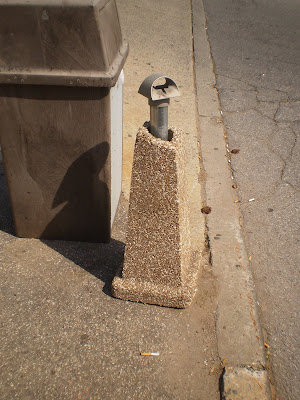
Ever since the Miss America Organization has taken up the Go Green Platform, I have been developing ways to incorporate my platform with the Keep America Beautiful Campaign, whose mission is to engage individuals to take greater responsibility for improving their community environment. Now one of my pet peeves is when people flick cigarette butts onto the ground like it's nothing. Little do these smokers realize how hazardous this habit is to the environment. Cigarette butt littering constitutes as a major environmental crisis, which is why I thought this was an excellent way to make the going green connection with my platform.
Keep America Beautiful launched the Cigarette Litter Prevention Program in 2002. It wasn't until 2005 when the Cigarette Litter Prevention Program made a statement addressing the nation's most widespread litter problem- improperly disposed cigarettes butts. Research has proven that cigarette butts are the most littered item in America, accounting for nearly 0ne-third of all litter nationwide (measured by item number, not volume). Smokers who would never consider littering an aluminum can, a piece of paper, or other items may be littering cigarette butts. This epidemic of cigarette littering is caused when ash receptacles are not readily available. Littering mainly occurs at transition points- places where a person must discontinue before entering a smoke-free environment. Some examples of transition points include bus stops, store entrances, and walkways leading toward public buildings. Lack of awareness and increased outdoor smoking adds to the visible impact of cigarette littering. Many American smokers believe that cigarette butts are an exception to the no-littering rule because they see butts as a more natural kind of trash than a plastic bottle. Most people assume they are biodegradable and pose no long term threat to the environment...BIG MISCONCEPTION. The fact is that 99% of cigarettes sold today are filtered. Those filters are made of cellulose-acetate, a form of plastic that is not biodegradable. Filters capture substantial amounts of tar and nicotine from burning cigarettes. Once cigarettes become used butts, they act as repositories for other toxic chemicals. So if a cigarette butt enters a sewer, it will be swept into the river and eventually out to sea where it releases toxins like benzene and cadmium. These toxins end up killing marine life and contaminating domestic water supply systems. Cigarette butt littering is also costly. Cleaning up the butts requires additional sidewalk and street sweeping, greenway and park maintenance, storm drain cleaning, and increased maintenance of storm water filters. Residents and business owners bear the expense of cigarette butt litter cleanup around entrances, exits, sidewalks, and parking lots. Last year, San Francisco Mayor Gavin Newsom placed a 33-cents-a-pack tax in order to cover the $11 million that the city spends annually to remove cigarette litter. So not only is cigarette butt littering unsightly and ubiquitous, but it is also expensive to clean up.
Staten Island has been increasing the number of facilities and other public places that have made the transition to become smoke-free. I spent the day visiting some of these public places to see where cigarette butts are prominent. Since Staten Island is known as the "Borough of Parks", I decided my first stop was going to be the most visited park on the island: Clove Lakes Park. I was pleasantly surprised to find only a few cigarette butts by the entrance of the park (clearly a transition point). I believe people have a respect for nature and treat the park as a recreational location. I saw many people either walking, running, or bike riding...definitely not smoking. I was pleased with the results and moved on to the next location: some of Staten Island's health care facilities.
 Clove Lakes Park
Clove Lakes Park Just a few cigarette butts at the entrance of the park
Just a few cigarette butts at the entrance of the park
 ...and right by this bench which is also by the entrance
...and right by this bench which is also by the entrance As I was heading to the health care facilities I imagined that they would have the same results as the park...I was wrong...very wrong. Richmond University Medical Center was the next stop on my cigarette butt mission. As soon as I approached the entrance I was greeted by an enlarged stop sign that read "THIS IS A SMOKE FREE/TOBACCO FREE CAMPUS". However, people have disregarded this sign because I saw two groups of people actually smoking within the campus. There were clutters of cigarette butts just a few feet away from the campus. Across the street is the Regional Radiology North. They also had signs that covered the entire fence. Once again, there was a group of people smoking by the fence. Both areas had no ash receptacles, not even at the entrance of the campus.

Richmond University Medical Center with one of its smoke free signs by the entrance
 As you can see it is pretty hard to miss this sign
As you can see it is pretty hard to miss this sign
 Regional Radiology North with its tobacco free sign
Regional Radiology North with its tobacco free sign  ...and the cluster of cigarette butts right below the sign
...and the cluster of cigarette butts right below the signStaten Island University hospital North was my last stop of the day. Just like the two facilities before it, the hospital also had a smoke free sign at all the entrances. However, I made an interesting discovery as I walked around the campus. On the Mason Avenue side of the hospital, I noticed cigarette butts everywhere with no ash receptacles. On the Seaview Avenue side, I found two ash receptacles (finally a sigh of relief). However, it seemed that some smokers did not use them. I found a few cigarette butts right next to them! You would think people would have the decency to dispose of their cigarettes properly. What disturbed me the most was when I found a cluster of cigarette butts right at the entrance of the hospital's Heart, Lung, and Surgery building. Smoking is the number one cause of lung cancer. Finding these butts by this specific building made me realize that people do not respect the health care facilities as much as the recreational locations such as the parks.
 Staten Island University Hospital North enforcing the smoke free environment
Staten Island University Hospital North enforcing the smoke free environment
 The result of lack of ash receptacles on Mason Avenue
The result of lack of ash receptacles on Mason Avenue
 An ash receptacle on Seaview Avenue...with a cigarette butt right next to it
An ash receptacle on Seaview Avenue...with a cigarette butt right next to it A broken ash receptacle on Seaview Avenue
A broken ash receptacle on Seaview Avenue Some positive reinforcement: The Smoke-Free Air Act assures clean air and healthful environment by prohibited smoking throughout the facility, prohibited smoking on the property of the facility, and requiring the posting of signs.
Some positive reinforcement: The Smoke-Free Air Act assures clean air and healthful environment by prohibited smoking throughout the facility, prohibited smoking on the property of the facility, and requiring the posting of signs.
 And here are the cigarette butts found right outside...
And here are the cigarette butts found right outside...
 ...the Heart, Lung, and Surgery building
...the Heart, Lung, and Surgery building
I am committed to improving the appearance of my community by making ash receptacles more available. I have contacted the three City Council Members who represent Staten Island asking for a sponsorship to place ash receptacles at places where smokers must extinguish their cigarettes before entering a smoke-free environment. This would act as a visual reminder to properly dispose of cigarette butts. Having more ash receptacles will alleviate this epidemic and ultimately improve the community. I hope to achieve my goal by the end of this year.


 The Marines
The Marines The Navy
The Navy
 Rolling Thunder, a group of veterns devoted to POW-MIA issues
Rolling Thunder, a group of veterns devoted to POW-MIA issues
 May 31st isn't only significant for Memorial Day. Each year on this date the World Health Organization celebrates World No Tobacco Day, highlighting the health risks associated with tobacco use and advocating for effective policies to reduce consumption. Tobacco use is the second cause of death globally and is currently responsible for killing one in 10 adults worldwide. The World Health Assembly created World No Tobacco Day to draw global attention to the tobacco epidemic and its lethal effects. It provides an opportunity to highlight specific tobacco control messages and to promote adherence to the World Health Organization Framework Convention on Tobacco Control. Tobacco use is the number one preventable epidemic that the health community faces.
May 31st isn't only significant for Memorial Day. Each year on this date the World Health Organization celebrates World No Tobacco Day, highlighting the health risks associated with tobacco use and advocating for effective policies to reduce consumption. Tobacco use is the second cause of death globally and is currently responsible for killing one in 10 adults worldwide. The World Health Assembly created World No Tobacco Day to draw global attention to the tobacco epidemic and its lethal effects. It provides an opportunity to highlight specific tobacco control messages and to promote adherence to the World Health Organization Framework Convention on Tobacco Control. Tobacco use is the number one preventable epidemic that the health community faces.


































 David Wyle, Director
David Wyle, Director Becoming a successful actress has always been one of my career ambitions. I aspire to perform as a triple threat in film, television, and on Broadway. Like most performers with the same ambition as me, I have been promoting myself to casting directors, choreographers, and producers on a daily basis. Building a strong resume is a key factor in becoming successful in this very tough career path. I got the opportunity to make my resume stronger by adding a feature film to it. Yesterday morning I received a phone call from C & G Casting that I had been booked as an extra for the upcoming film The Smurfs!!!!!!!!!!!!
Becoming a successful actress has always been one of my career ambitions. I aspire to perform as a triple threat in film, television, and on Broadway. Like most performers with the same ambition as me, I have been promoting myself to casting directors, choreographers, and producers on a daily basis. Building a strong resume is a key factor in becoming successful in this very tough career path. I got the opportunity to make my resume stronger by adding a feature film to it. Yesterday morning I received a phone call from C & G Casting that I had been booked as an extra for the upcoming film The Smurfs!!!!!!!!!!!! 
















